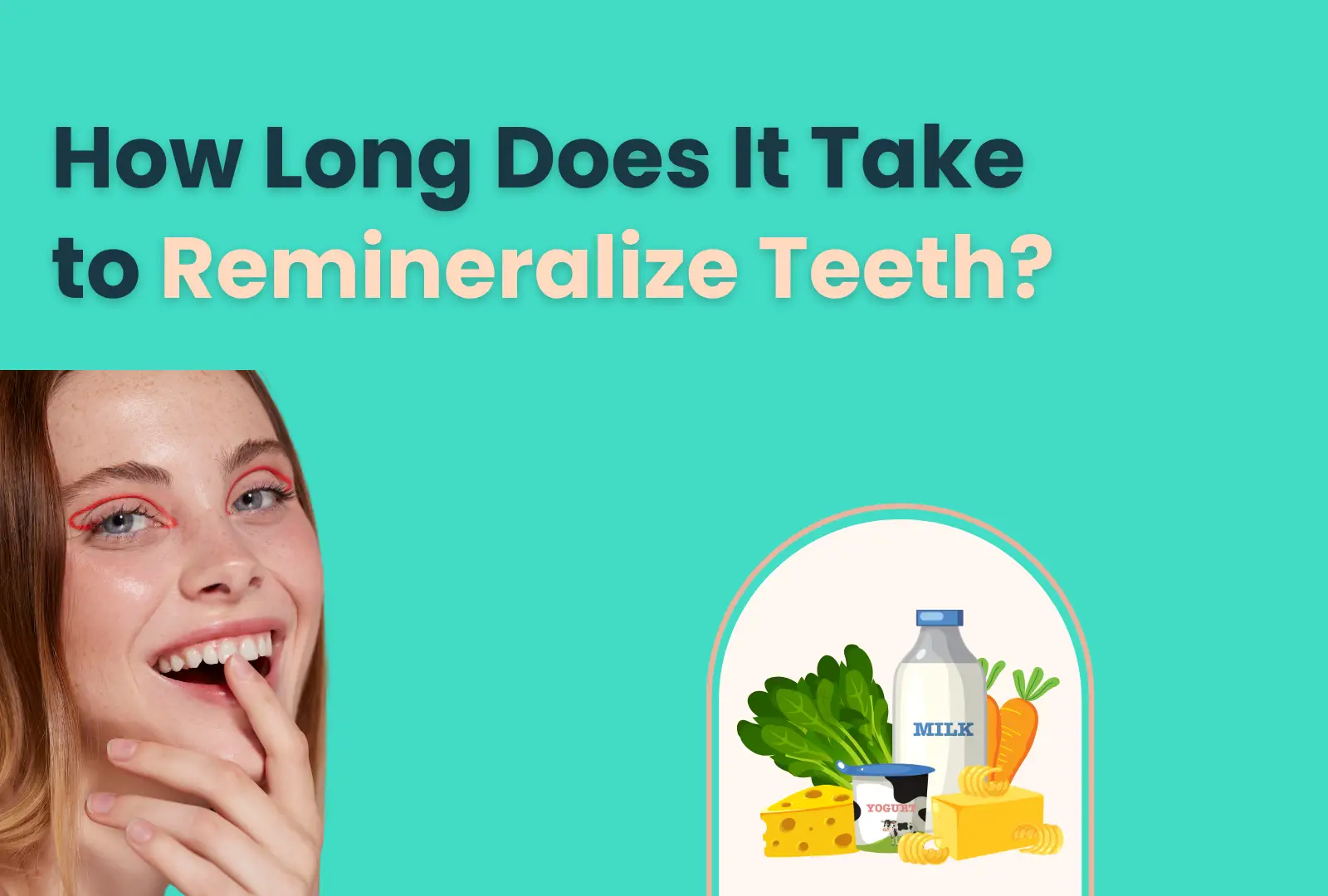
If you’ve noticed tooth sensitivity or visible enamel wear, you might be wondering, how long does it take to remineralize teeth? Enamel erosion can leave your teeth vulnerable, but the good news is that your teeth have the ability to repair themselves naturally through a process called remineralization.
But just how long does this process take? And more importantly, what can you do to speed it up? In this guide, we will share effective methods to accelerate it and give you practical tips to help you understand how long it takes to remineralize teeth and how to restore your enamel faster.
| Key Takeaways Tooth remineralization is a natural process where lost minerals like calcium and phosphate are replaced in enamel, helping to restore and protect your teeth from decay and damage. On average, remineralization can take anywhere from 1-2 weeks for minor enamel demineralization, but more severe damage may take 3-6 months to show noticeable improvement. Fluoride treatments are one of the most effective ways to speed up remineralization, as fluoride helps attract calcium and phosphate to enamel and forms a stronger, more acid-resistant version of enamel. Natural methods, such as consuming calcium-rich foods, staying hydrated, and stimulating saliva production, also support the remineralization process and contribute to healthier enamel. Signs that remineralization is working include reduced tooth sensitivity, stronger enamel, a shinier appearance, and reduced plaque build-up as enamel becomes more resistant to damage. While enamel cannot fully regenerate, remineralization can strengthen and protect the remaining enamel, though professional dental advice is recommended if there are visible cavities or persistent sensitivity. |
What is Tooth Remineralization?
Tooth remineralization is the process through which lost minerals are replaced in the tooth enamel. Enamel, the hard outer surface of the tooth, is essential for protecting the underlying layers from decay, wear, and damage. However, enamel is susceptible to erosion from acids in food, beverages, and even from the acids produced by bacteria in the mouth. When enamel is worn down, minerals like calcium and phosphate are lost, leading to weakened enamel and cavities.
The body naturally attempts to repair this damage through a process called remineralization. This occurs when minerals from saliva and certain foods are deposited back into the enamel. Saliva plays a key role, as it is rich in calcium, phosphate, and fluoride, all of which help restore the enamel. However, this process is gradual, and it can be influenced by factors such as diet, oral hygiene, and the presence of fluoride treatments.
How Long Does It Take to Remineralize Teeth?
On average, remineralization can take anywhere from a few weeks to several months, depending on the severity of the enamel damage and the steps taken to support the process. It’s important to note that natural remineralization is a slow process, and full remineralization may not be possible without additional interventions like fluoride treatment or changes in diet.
However, for more severe damage, it may take longer, up to 3-6 months, for noticeable improvement. Studies show that remineralization results vary, with some methods showing improvements in 1-2 weeks, while others may take several months
Dental professionals emphasize that while enamel cannot regenerate once lost, it can be strengthened through remineralization. Dr. Praveen Sharma, an associate professor in restorative dentistry, advises, “Brushing before breakfast and last thing at night, for a full two minutes without rinsing after, maximizes fluoride benefits.”
He also notes that saliva plays a crucial role in remineralizing teeth, so it’s important to wait about 30 minutes after eating before brushing to allow enamel to harden naturally. Additionally, fluoride varnishes are recognized for their effectiveness in promoting enamel remineralization and preventing decay.
Methods to Speed Up Remineralization
While remineralization is a natural process, certain methods can accelerate it, helping you restore your enamel more effectively. The following methods range from fluoride treatments to natural approaches, and each can contribute to faster and more efficient remineralization.
Using Fluoride
Fluoride is one of the most effective agents for remineralization. It enhances the remineralization of tooth enamel by attracting calcium and phosphate to the enamel surface. When fluoride is absorbed into the enamel, it forms fluorapatite, a stronger and more acid-resistant version of enamel. Fluoride can also reduce tooth sensitivity and prevent further enamel breakdown.
If you’re looking for a quick fix, fluoride treatments from your dentist can make a noticeable difference in just 1-2 weeks. Using fluoride toothpaste regularly also helps, but you’ll likely see more gradual results over time. Remember, a fluoride rinse or professional treatment can jump-start the process if you’re dealing with early enamel damage.

| Did You Know? One common mistake is overusing fluoride treatments in an attempt to speed up remineralization. While fluoride is effective, too much can lead to fluorosis or weakened enamel. Another mistake is expecting immediate results, as remineralization is a slow process and requires consistent care. To avoid these pitfalls, stick to recommended fluoride usage and be patient as the process unfolds over time. |
Natural Methods
If you’re more into natural methods or want to support your teeth with healthy habits, there are simple dietary and lifestyle changes that can really accelerate remineralization. These methods take a little more time, but they are backed by science and are a great addition to fluoride treatment.
- Dietary Changes: Foods rich in calcium, phosphorus, and vitamin D help strengthen enamel. Dairy products like milk, cheese, and yogurt, leafy greens, eggs, and fatty fish are all great choices to nourish your teeth from the inside out. You can also snack on almonds or cheese between meals to boost your calcium intake and help your enamel stay strong throughout the day.
- Supplements: Sometimes, our diets aren’t enough to provide all the minerals we need. If that’s the case for you or your family, consider calcium, vitamin D, or magnesium supplements. These minerals are key for strong teeth and bones, and ensuring you’re getting enough can support your enamel’s natural repair process.
- Saliva’s Secret: Saliva plays an underrated role in tooth remineralization. It’s rich in calcium, phosphate, and fluoride, helping to naturally remineralize enamel. The more saliva you have, the more minerals are delivered to your teeth. Stay hydrated and encourage your kids to drink plenty of water throughout the day to keep their mouths moist and healthy. Chewing sugar-free gum after meals can stimulate saliva production and help neutralize acids in the mouth—perfect for fighting tooth decay on the go.

Lifestyle Changes
It’s not just what you eat; it’s also what you avoid that can make a huge difference in how quickly your enamel recovers. Here are a few easy lifestyle changes that can help protect your teeth:
- Cut Back on Acidic Foods and Drinks: Citrus fruits, soda, and coffee are all delicious, but they can be harsh on your enamel. They create an acidic environment in your mouth, which can wear down enamel over time. Reducing their consumption will give your teeth the best chance to remineralize.
- Master Proper Oral Hygiene: Brushing and flossing twice a day is a given, but you can also rinse with water after meals to help neutralize acids and keep the remineralization process going. Use a soft-bristled toothbrush to avoid causing further damage to your enamel, and choose a toothpaste with fluoride for the best results.
How to Tell if Your Teeth Are Remineralizing
Now that you’ve started the process of remineralizing your teeth, how do you know if it’s actually working? The signs of remineralization can be subtle, but with a little awareness, you can easily spot them. Here’s what to look out for to see if your teeth are on the mend.
- Reduced Sensitivity: One of the most noticeable signs that your teeth are remineralizing is a reduction in tooth sensitivity. If you’ve been dealing with sharp pain when eating hot, cold, or sweet foods, you may start to notice that these sensations become less intense as your enamel strengthens and rebuilds. When enamel begins to remineralize, it forms a protective barrier over the dentin, which is the sensitive part of your tooth. This helps reduce pain from stimuli like temperature changes and sugary foods.
- Enamel Strengthening: As your enamel remineralizes, it becomes harder and more resistant to damage. While this might not be as immediately visible as a change in color, you might notice that your teeth feel stronger when you bite into food. You may also find that they are less prone to chipping or cracking.
- Shiny, Glossy Appearance: Another sign that remineralization is working is a shiny, glossy appearance on your teeth. When enamel is replenished with minerals, it can regain its natural shine, which may have been lost due to acid erosion.
- Reduced Plaque Build-up: While remineralization itself may not directly remove plaque, stronger enamel can make it harder for plaque to stick to your teeth. As your enamel becomes more resistant to damage, plaque build-up may slow down, making it easier to maintain clean teeth.
| Can Enamel Truly “Regrow”? A common misconception is that enamel can completely regrow after it’s been damaged. In reality, enamel cannot fully regenerate. Once it’s lost, it doesn’t grow back like other tissues in the body. However, the remineralization process can help restore some of the strength and protection to your enamel, though it won’t bring back its full thickness. While you can significantly improve and strengthen your enamel through remineralization, complete regeneration is not possible. |
When to Seek Dental Advice
While many cases of enamel damage can be managed with at-home remineralization methods, there are times when it’s important to seek professional dental advice. If you notice any of the following, it may be time to schedule a visit to the dentist.
- Persistent sensitivity that doesn’t improve or worsens
- Visible cavities or holes
- Severe staining or discoloration
- Difficulty with chewing or biting
If you notice any of these signs or have concerns about your enamel, don’t wait—schedule an appointment with your dentist today for a personalized treatment plan. Your smile deserves the best care!
Frequently Asked Questions
What can I do to speed up the remineralization of my teeth?
To accelerate the remineralization process, focus on fluoride treatments, eat a diet rich in calcium and phosphorus, and maintain proper oral hygiene. Drinking plenty of water, chewing sugar-free gum, and using a fluoride toothpaste can also support your efforts. Additionally, avoiding acidic foods and drinks can prevent further enamel damage and create the best environment for remineralization.
How long does it typically take to fully remineralize teeth?
The timeline for remineralization varies based on the extent of enamel damage and individual factors like age and diet. Minor damage may show improvement in 1-2 weeks, while more significant enamel erosion can take several months to fully remineralize. Fluoride treatments can help speed up this process.
How can I tell if my teeth are actually remineralizing?
Signs of remineralization include reduced sensitivity, a glossier, shinier appearance on your teeth, and improved enamel strength. You may also notice less plaque build-up as remineralization makes your enamel smoother and more resistant to decay.
Is it ever too late to start remineralizing my teeth?
It’s never too late to start supporting your enamel! While severe cavities and enamel loss cannot be fully reversed, early enamel demineralization can still be remineralized with the right treatments and lifestyle changes. If you’re unsure, consult with your dentist for personalized advice.
